Search
Showing 10 of 1702 results for the cuzzy rolly, latest
-
From the Chief Executive: Positive steps for international education
Initially focused on Asia, the Prime Minister’s scholarships started in 2013. Since then, more than 2,400 Kiwis have benefited from the experience of living in an Asian or Latin American country, developing personal connections, cultural understanding and global citizenship skills as well as gaining new perspectives in their chosen field of study. These scholarships are a great example of the two-way nature of international education – it’s about the opportunity for us as New Zealanders to learn, as well as for us to contribute.
Over the years the scholarships have evolved and this is set to continue in the future, following two recent wānanga with Māori partners. The first wānanga explored what ‘global citizenship’ means from a Māori world view. The second wānanga discussed the Prime Minister’s Scholarship programme, how to grow Māori participation in it, and how to support rangatahi through creating programme connections with iwi and the Māori economy, so the programme provides greater value for Māori. Alongside participants from a range of iwi and sector interests, representatives from the newly formed Kāhui Kaupapa also attended – Māori alumni of the Prime Minister’s Scholarships for Asia and Latin America. This work is part of ENZ’s long-term programme to build partnerships with iwi, Māori and Māori providers of education services, to transform the understanding of international education and ensure the education system delivers with, and for, Māori in the international context.
We have also made good progress with plans for inbound travel for international education this month. Universities are currently using our new portal system to nominate international students for their 1,450 places as part of the fourth cohort of 5,000 students. Working with the Ministry of Education, we are now assessing applications for places received from schools, PTEs and English language schools and will let them know their individual place allocations next week, so that they can start sending in their nominations, along with Te Pūkenga. Immigration New Zealand is due to begin processing the first formal requests for travel under this border exception by mid-April, in time for a mid-year study start.
In related news, travel from visa waiver countries such as Japan and South Korea has been brought forward two months and will now reopen from 2 May 2022. Students from these countries will be able to come to New Zealand for short courses of up to three months, which is good news for the sector, including English language schools.
While the borders were closed, online education offerings assumed a greater role. This sets us up well to continue to provide a more varied and resilient international education offering in the future. Phase two of a pilot programme to promote New Zealand-branded online education to the world starts in June and interested education providers are invited to a webinar on 31 March 2022 to find out more. This phase of the pilot will continue our partnership with FutureLearn, a well-established online platform with a significant global audience.
COVID-19 has affected our daily lives in many ways, including making virtual meetings the norm. When we held our regular peak body and regional gatherings last week, it was noticeable that a greater degree of formality tends to prevail online, and it’s much harder to get lively discussions underway. We really value and need to hear from our industry partners, and so I would welcome any suggestions for how we can make sure that these meetings enable robust discussion and exchange of ideas.
This month we welcomed Ziena Jalil to her first meeting as an ENZ Board member. Ziena was once an international student and is now an award-winning business and public sector leader, with 20 years’ experience working in New Zealand and Asia. Ziena brings enormous expertise in education, international relations and marketing, which will greatly benefit ENZ and the wider international education sector as we work to rebuild post-COVID.
This month we also published our 2020/21 Annual Report, which had been delayed by a shortage of auditors, related to COVID-19. The report is available on our website here and highlights the impacts of COVID-19 on the sector and our joint efforts to maintain an ongoing commitment to international education during this challenging period.
Okea Ururoatia! – Keep striving forward!
Grant McPherson
-
Around the world in five: March 2022
International
Opinion... from the News Editor, 17.03.22
India joins hands with Australian government to establish taskforce on qualifications recognition
New Zealand
New Zealand confirms details of 5,000 international student cohort
Call to end cap on number of international students allowed in NZ
Australia
Once again, international student ‘exports’ are wildly exaggerated
Australia's one-off opportunity to change its approach to international students
Only Half of International Students May Return to Australia This Year
Aus: $10m innovation fund revealed
India
Auckland University Offers 10 Virtual Internships for Indian Women Students
Everest Twins and Miss Malini share their stories at International Women’s Summit
Edtech a big draw among teachers despite covid ease
United Kingdom
Record UK University Applications from UAE
United States
Biden immigration rule will harm American college graduates, expert warns
US: international students say experience doesn’t justify cost
Vietnam
Bravery of international students after Covid-19
New Zealand offers digital technology training scholarships to teachers
-
Education Products & Services

Overview
Education products and services (EPS) companies are an important part of Aotearoa New Zealand’s international education industry, supporting learners and education at all ages and levels in New Zealand and around the world.
More than ever before, EPS companies are supporting and informing the way education is consumed around the world. Students benefit from more individualised digital learning content, while education systems benefit from more dynamic, fit for purpose education tools and services specifically designed and aligned to meet curriculum requirements.
With the ability to develop ‘weightless technology-based resources and tools’, EPS can now have a low environmental impact. Learning and education support need not be ‘place-based’ and the ability to access learning can now be from anywhere, anytime. This in turn supports a more equitable education system, one that can develop confident, well equipped digital citizens around the world.

About the EPS sector
The EPS sector in New Zealand includes education publishers, and education technology (EdTech) companies.
Key capabilities include:
- Platforms for administration, student management, content management and learning management within the education sector
- Digital learning content and services used by learners, education providers and organisations connected to education and learning
- Consultants and advisors with specialist EdTech and educational publishing domain knowledge that support the education sector with expertise on product design, learning design or organisational development
- Digital and print designed and developed curriculum aligned tools from ECE to postgraduate study and lifelong learning.
Education publishers
New Zealand’s education publishers have a proud record of innovation and forward thinking. They are pioneers in early childhood education, reading recovery, big book shared reading, and in the revitalisation of New Zealand’s indigenous language and culture. They have also been early adopters of digital formats and technologies.
They have reached learners and educators in 60 countries, in some cases for more than 40 years. They are also major providers of literacy materials and resources to Australia, the United States, the United Kingdom, China and others.
The Publishers Association of New Zealand Te Rau o Tākupa (PANZ) represents 30+ education publishers. PANZ provides learning and development opportunities, professional advice, and national and international representation for its members.
To find out more about New Zealand’s education publishers click here.

Education technology companies
From New Zealand to the world - it’s a path many New Zealand EdTech companies have followed.
More than 90% of New Zealand EdTech businesses export across the globe. Principal markets are the United States and Australia which account for 50% of exports, followed by Asia and Europe which account for another 30%. The remaining markets span the Middle East, Africa, and Latin America.
Established in 2017, the Education Technology Association of New Zealand (EdTechNZ) connects, supports and promotes EdTech companies to advance the sector’s ambitions domestically and for export.
A range of EdTech platforms and technologies – from immersive reality platforms (AR, VR, MR) to artificial intelligence (AI) and more – can be found in a number of education categories and tools including:
- Knowledge and content tools
- Education management systems
- Delivery models
- Experiencing learning tools
- Learning support platforms
- Assessment and verification tools
- Workforce skills and talent training and management.
To find out more about New Zealand’s EdTech community ecosystem click here.
Resources and support for EPS companies
ENZ’s role
ENZ, in conjunction with NZ Inc agencies, seeks to support the sector’s export aspirations.
At a policy development level this has included acknowledging the contribution and role of the EPS sector in government strategies and policies, such as the New Zealand International Education Strategy and the Recovery Plan for International Education.
Across the industry ENZ also partners with professional associations, PANZ and EdTech NZ, to undertake research and strategic initiatives, facilitating introductions and connections for EPS companies, including through the New Zealand government’s offshore networks.
ENZ supports visibility and awareness raising activities of the EPS sector, promoting and marketing New Zealand education in global markets, and also sharing data and insights into global and emerging markets.
Recent ENZ initiatives
- ENZ partnered with PANZ to undertake research into Export Market Opportunities for Education Publishers in 2021. The research paper can be accessed from Intellilab.
- ENZ supported the development of the Education Publishers website.
- In 2021, ENZ partnered with EdTechNZ to develop the Aotearoa EdTech Excellence white paper. This paper outlines the New Zealand EdTech community’s kaupapa (values), history, landscape and opportunities.
- ENZ also partnered with EdTech NZ to develop an ecosystem map of the EdTech community.
NZ Inc agencies
Other New Zealand government agencies may also offer help, advice, and support to the EPS sector at various times.
The Ministry of Foreign Affairs and Trade (MFAT) is the Government’s lead advisor on foreign affairs and trade. It works to build a safe, more prosperous and more sustainable future for New Zealanders by forging strong international connections with diplomats, trade negotiators, analysts and advisors from other countries. The Ministry works with global organisations such as the United Nations, the Commonwealth, the World Trade Organisation (WTO) and the Organisation for Economic Cooperation and Development (OECD). At a regional level it works with APEC, ASEAN and the Pacific Islands Forum.
New Zealand Trade and Enterprise (NZTE) supports exporters to grow their businesses internationally.
You may be able to access the following NZTE services:
- Subscribe to NZTE’s myNZTE for up-to-date market insights, tools, and export guidance
- New Zealand Story supports exporters to tell their story to the world and offers the FernMark Licence programme to the EPS exporter community
- The New Zealand Tech and Innovation Story has a useful toolkit for digital education exporters.
For more information
If you are a New Zealand education publisher or EdTech company and want to learn more about how ENZ may be able to support you, we are here to help.
Please contact Alana Pellow in the ENZ Industry team.
-
New Zealand-German academic exchange programme
Under a bilateral exchange arrangement with Germany, Education New Zealand supports early-career researchers from New Zealand to collaborate on research projects in Germany.
Education New Zealand Manapou ki Ao (ENZ) and the German Academic Exchange Service (DAAD) signed a Programmes for Project-Related Personal Exchange (PPP) arrangement in November 2021. Under the arrangement, Education New Zealand contribute funding to support early-career academics from New Zealand universities and Te Pūkenga – New Zealand Institute of Skills and Technology to travel to Germany.
The PPP programme aims to strengthen academic relations between New Zealand and German institutions and to promote cooperative and complementary research activities. It enables young academics involved in the project to further their careers and expand international research links.
The programme covers all subject areas and is open to students who are close to completing their doctorate and to academics who completed a doctorate within the last five years from the date of application.
Applications for the 2024 round are now closed.
-
Report from GHEDEX 2022
This year saw a welcome return to an in-person event, attracting good numbers of students and international education stakeholders. ENZ showcased New Zealand as an education partner for Oman during the “Quality in Higher Education” conference that took place alongside GHEDEX. While in Muscat, ENZ also hosted an event for Omani alumni of New Zealand universities. Twenty-eight attended, from seven universities, providing a useful networking opportunity.
Officials at GHEDEX confirmed that as our border is reopening, New Zealand is included in the just-released Omani Ministry of Higher Education’s 2022/23 handbook for scholarships. Feedback from education agents suggests that fewer scholarship students overall are expected this year.
Dr Nadia Kasto, New Zealand Academic Advisor for the Omani Consulate-General in Melbourne confirmed that from next year, all Omani scholarship students will be able to make their own decisions about the country and university that best suit their study needs.
“All universities have to work very hard to promote themselves to Omani students in order to get as many students as they can.”
-
Kōrerorero on quality education
Panellists included
- Dr Dawn Freshwater, Vice-Chancellor at the University of Auckland, who is also the first woman to hold this role
- Dr Sandra Regina Goulart Almeida, Vice-Chancellor at the Federal University of Minas Gerais (UFMG) in Brazil
- Dr Alejandro Ceballos, Vice-Chancellor at the Universidad de Caldas in Colombia.
With simultaneous interpretation in Spanish and Portuguese, the session attracted more than 100 attendees and 350 registrations from across Latin America and Aotearoa New Zealand. Panellists shared their thoughts on gender equality, integration, and inclusion, and how to achieve more equitable access to quality education. They also discussed the main priorities and focus of their institution in relation to SDG 4, and how they overcome challenges to achieve the SDG’s objectives.
Education New Zealand Manapou ki te Ao’s Kōrerorero webinar series is intended for academics, education agents and media in Latin America and New Zealand. It has been particularly effective in maintaining awareness of a New Zealand education while our borders are closed, while also contributing to discussions on important matters related to international education. Across the six episodes since its launch in 2020, more than 1,000 people have attended, with many subsequent views on YouTube.
If you would like to watch this episode, please click here
-
Strong start for Cohort 4 international students
Already more than 3,500 international students have been nominated by their education providers and confirmed by education agencies. More than 1,900 of these students have had their Request for Travel approved and have been invited by Immigration New Zealand to apply for their student visas, since the process opened on 13 April 2022.
Places remain available for students with a number of ELS and PTE providers. Only education providers can nominate students for this cohort. Interested international students or their agents should contact ELS or PTEs as soon as possible. Of the 5,000 places in this cohort, 1,000 were allocated to ELS and 850 to PTEs, with the remainder going to universities, Te Pūkenga, and secondary schools.
Once they have been nominated by an education provider and confirmed by education agencies, students have two weeks to make their Request for Travel through the Immigration New Zealand website. Following approval of the Request for Travel, students then have one month to complete and submit a student visa application to Immigration New Zealand, in time for a mid-year start for their studies.
Education providers are due to complete their nominations by 6 May 2022. Any unused places will be transferred to other providers, which means that some providers may get additional places as part of the reallocation process.
This is the fourth cohort of international students to be granted a border exception to enter New Zealand and is part of the progressive reopening of our borders. All visa categories are due to reopen from October 2022 onwards, including visitor and student visas.
For more information on this cohort of international students, see Cohort 4 » Education NZ (enz.govt.nz)
-
New advisory board to support our North American strategy
Established by Education New Zealand Manapou ki te Ao in 2021, this voluntary advisory board includes former Study Abroad scholarship winners to New Zealand, independent education counsellors, and senior leaders in international education in the United States. Members have a shared interest in developing educational ties between the US and NZ and are supporting ENZ’s North America team to implement our strategy for this market.
The 10-member board has established three sub-committees that will develop signature projects to raise awareness of New Zealand’s education brand and promote student flow between the two countries. The sub-committees cover:
- Alumni engagement and student experience: Three board members were former students in New Zealand and discussed ways in which ENZ and institutions could better support international students before, during, and after their study experience in New Zealand.
- State consortia engagement: The United States is vast and decentralised. This sub-committee is advising and assisting with partnership development around State-run education consortia that, in some States, oversee international education initiatives from Kindergarten through PhD-level Colleges and Universities.
- Foundation engagement: In the US, grants, research and special projects are largely funded by foundations set up by companies and individuals. Sub-committee members will use their expertise and networks to help identify foundations whose interests align with ENZ’s and New Zealand’s education and economic goals to set up funded partnerships between the two countries.
The overall aim of this work is to:
- position New Zealand as a destination of choice for students from diverse backgrounds by promoting and changing the understood narrative of New Zealand
- identify and develop strategic, reciprocal partnerships that align with our goals
- evaluate aspects of our programming and outreach related to:
- diversity, equity, and inclusion (DEI)
- student care
- help the ENZ North America team determine how we translate and explain Māori values to North American audiences, how they relate to our work, and how they can contribute to the field of international education
- provide a North American context to international education including but not limited to study abroad, full degree, exchange, and hybrid learning.
DEI is a core part of ENZ’s North American strategy for international education. We hope to move beyond perceptions of New Zealand as a country suitable for adventure seekers, to position New Zealand as a diverse country with a strong bicultural heritage, rich ideals of social justice, and an ideal education destination for students from marginalised backgrounds.
-
Delegation promotes NZ in Japan
Arrangement with Japan Women’s University
An Education Cooperation Arrangement with Japan Women’s University (JWU) was signed on 22 April by Dr Ryoko Imaichi, Chancellor, Japan Women’s University Educational Corporation, and Grant McPherson on behalf of Education New Zealand Manapou ki te Ao. The Prime Minister was also present and spoke at the event.
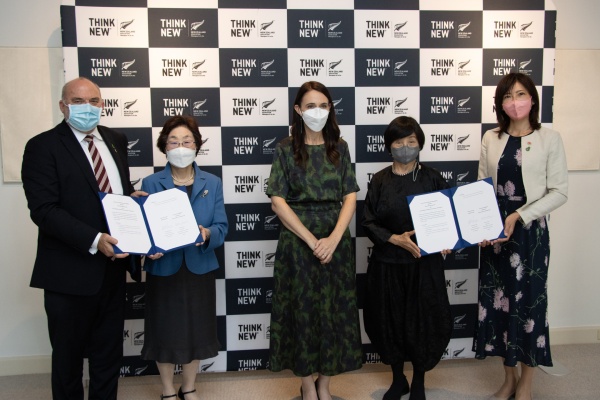
Image above: From left, Grant McPherson, ENZ, Dr Ryoko Imaichi, Chancellor, Japan Women’s University Educational Corporation, Prime Minister Jacinda Ardern, Professor Satoko Shinohara, President, Japan Women’s University, Misa Kitaoka, Director of Education – Japan, ENZ
The partnership with JWU will see more students from the university and its four affiliated schools come to study in New Zealand. Eleven university and school students from the JWU network attended the signing ceremony and spoke with the Prime Minister about their pre-COVID 19 experiences travelling to New Zealand.
This event came shortly after the Prime Minister met with her former homestay sister from over 30 years ago. The homestay sister also attended the signing ceremony, where the Prime Minister spoke about her personal experience of international education, including hosting homestay students in New Zealand and studying abroad at Arizona State University.
“Like Japan, New Zealand is a long island nation from north to south, and while being influenced by diverse cultures, I deeply sympathize with the historical background that has led to the present. Moreover, the current New Zealand society, which embodies world-leading sustainability, should be a great learning experience for our students,” Professor Satoko Shinohara, President of Japan Women’s University, said.
In Japan, there is a strong focus on the United Nation’s Sustainable Development Goals at the national and institutional level. Gender equality has received more emphasis in recent years and the new arrangement is timely for many reasons, as New Zealand and Japan focus on reconnecting to look towards the future.
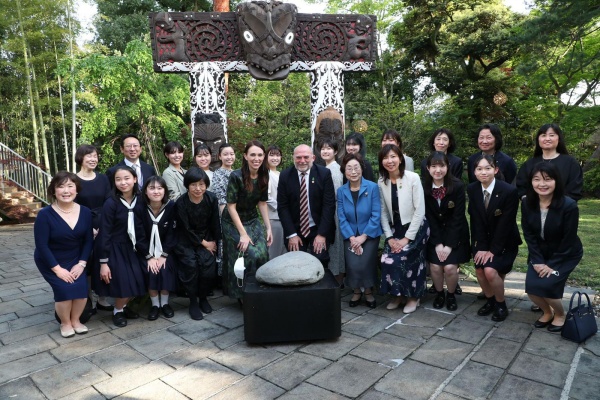
Relaunch of Game On English
The Prime Minister, alongside the President of Fonterra Japan, Yasuhiro Saito, and the Commissioner from Japan Sports Agency, Mr Koji Murofushi, relaunched the Game On English programme that had been paused due to COVID-19. The 2022 phase of Game On will see female rugby players travel to Hamilton to study English and receive high-performance rugby training, sponsored by Fonterra.
Originally launched in 2014, during former Japanese Prime Minister Abe’s visit to New Zealand, Game On English was an initiative that allowed New Zealand to support Japan’s efforts to lift international skills and English language capability while also supporting rugby skills development in the lead up to the Olympics and Rugby World Cup 2019. More than 195 female and male high school rugby players have visited New Zealand to participate in the three-to-four-week programme.
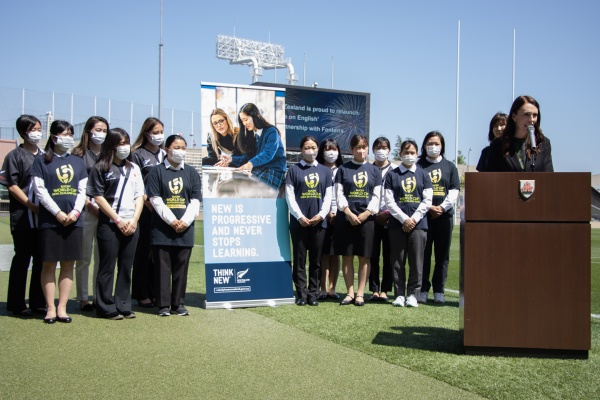
Image above: Prime Minister Ardern speaks at Chichibuya Stadium in Tokyo on 22 April 2022 to support the relaunch of Game On English for female rugby players to study English and receive rugby training.
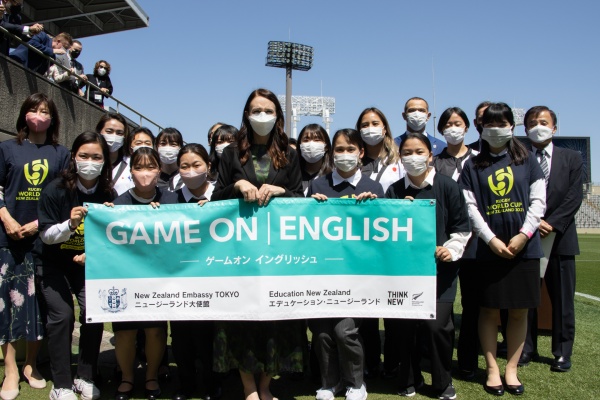
Working Holiday Scheme students
Former Working Holiday Scheme participants from Japan were invited to an event held at Cookie Time Harajuku (Tokyo) store. Several students spoke about their work or study experience, and a recurring theme was how New Zealand changed their life. Working Holiday visa holders from any country can study for up to six months while on a working holiday visa in New Zealand.
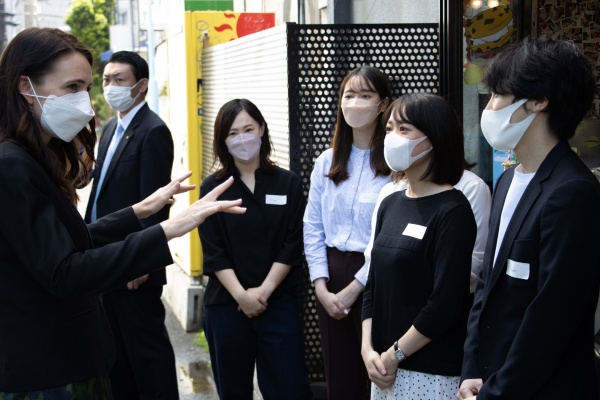
Image above: Prime Minister Ardern speaks to former working holiday visa holders about their work and study in New Zealand.
There has been extensive media coverage of all three events in Japan, including via national newspapers and TV stations. This coverage will support ENZ’s promotional activities before the New Zealand border reopens on 2 May 2022 to short-term students from Japan, as a visa-waiver country.
-
Upcoming offshore events related to international education – April 2022
Dates
Event
Location
8 - 11 May
International Conference & Exhibition for Education (ICEE)
Organised by the Saudi Ministry of Education, the conference has this year opened to wider participation. ENZ will host a pavilion with New Zealand universities, English language schools, and EdTech companies.
Contact: Bronwyn Shanks
Riyadh, Saudi Arabia
16 – 18 May
IECA Spring Conference
The Independent Educational Consultants Association (IECA) is a not-for-profit, international professional association representing experienced independent educational consultants. ENZ plans to attend to develop networks of IECs.
Contact: Lewis Gibson
North America
22 May
Study with New Zealand Virtual Fair
A co-funded virtual exhibition between ENZ and one of our ENZRAs in Viet Nam, IDP. The online session will promote New Zealand as a high-quality study destination and offers an opportunity for New Zealand institutions to communicate directly with potential students and parents.
Contact: Van Banh
Viet Nam
29 May, 4, 5 June
Code Camps – Future Proof Interactive series
A series of five code camps for Vietnamese school students, in a collaboration between ENZ and Code Avengers. The aim is to promote New Zealand’s future-proof education.
Contact: Van Banh
Viet Nam
31 May – 3 June
NAFSA: Association of International Educators annual conference 2022
This is the largest international education conference in the world, and this year’s theme is 'Building Our Sustainable Future'.
Contact: Lewis Gibson
Denver, Colorado, USA
13-16 September
European Association for International Education (EAIE)
EAIE is the largest business-to-business conference and international education event in Europe. This year’s theme is ‘The Future in Full Colour’. ENZ will host a pavilion with New Zealand universities and ITPs and run a networking event to engage with existing and new contacts face-to-face.
Contact: Olga Elli
Barcelona, Spain
14 – 15 September
Asia Pacific Technical Vocational Education and Training (APAC TVET) Forum
A partnership between ENZ, Te Pūkenga and Skills Consulting Group showcasing NZ vocational sector and its expertise. The forum will include academic and business-to-business/government-to-government elements, bringing together stakeholders across Asia and the Pacific to share expertise and capability.
Contact: Richard Kyle
Online –Asia and Pacific wide
21 – 29 October
China Education Expo (CEE)
Annual exhibition tour hosted by China Education Association for International Exchange (CEAIE) since 2000.
This major conference and expo is the leading international education event in China.
Contact: Jane Liu
Beijing, Guangzhou, Chengdu, Shanghai

